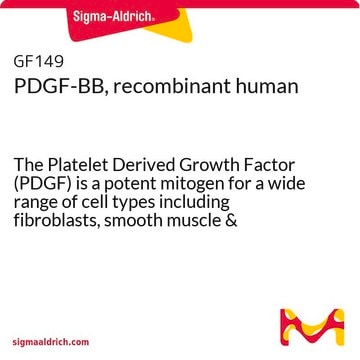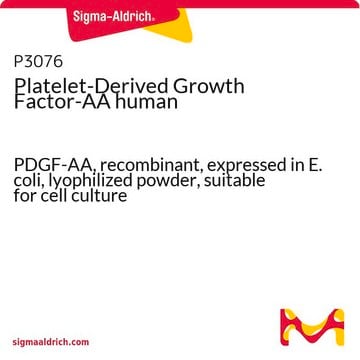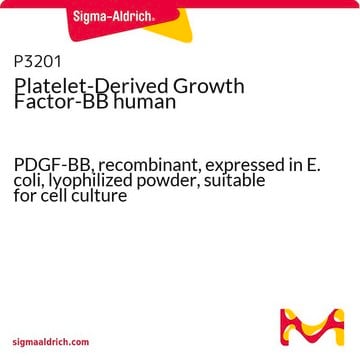GF343
PDGF-AA,
Human Recombinant Animal Free
Synonym(s):
PDGFA, PDGF-1, PDGF-A, PDGF1
Sign Into View Organizational & Contract Pricing
All Photos(1)
About This Item
UNSPSC Code:
12352202
eCl@ss:
32160405
NACRES:
NA.77
Recommended Products
Related Categories
General description
PDGFs are disulfide-linked dimers consisting of two 12.0-13.5 kDa polypeptide chains, designated PDGF-A and PDGF-B chains. The three naturally occurring PDGFs; PDGF-AA, PDGF-BB and PDGF-AB, are potent mitogens for a variety of cell types including smooth muscle cells, connective tissue cells, bone and cartilage cells, and some blood cells. The PDGFs are stored in platelet α-granules and are released upon platelet activation. The PDGFs are involved in a number of biological processes, including hyperplasia, chemotaxis, embryonic neuron development, and respiratory tubule epithelial cell development. Two distinct signaling receptors used by PDGFs have been identified and named PDGFR- α and PDGFR-β. PDGFR-α is high-affinity receptor for each of the three PDGF forms. On the other hand, PDGFR-β interacts with only PDGFBB and PDGF-AB.
Recombinant human PDGF-AA is a 28.5 kDa disulfide-linked homodimer of two A chains (250 total amino acids).
Recombinant human PDGF-AA is a 28.5 kDa disulfide-linked homodimer of two A chains (250 total amino acids).
Product Source: Protein is expressed in E.coli.
The protein is manufactured without the use of any animal products/reagents and is considered Animal-Free and can be used in protocols where possible transmisson of animal viruses and contamination must be avoided.
The protein is manufactured without the use of any animal products/reagents and is considered Animal-Free and can be used in protocols where possible transmisson of animal viruses and contamination must be avoided.
Application
Research Category
Stem Cell Research
Stem Cell Research
Research Sub Category
Growth Factors & Receptors
Growth Factors & Receptors
Quality
Determined by the dose-dependent stimulation of the proliferation of Balb/c 3T3 cells. The expected ED50 for this effect is 1.0-3.0 ng/ml.
Physical form
Product is presented in 10mM Acetic Acid and is filtered through a 0.2 micron filter before lyophilization.
Storage and Stability
Store at -20°C for up to 4 months from date of receipt Centrifuge the vial prior to opening.
Reconstitute in water to a concentration of 0.1-1.0 mg/ml. Do not vortex. For extended storage, it is recommended to further dilute in a buffer containing a carrier protein and store in working aliquots at -20°C.
Reconstitute in water to a concentration of 0.1-1.0 mg/ml. Do not vortex. For extended storage, it is recommended to further dilute in a buffer containing a carrier protein and store in working aliquots at -20°C.
Disclaimer
Unless otherwise stated in our catalog or other company documentation accompanying the product(s), our products are intended for research use only and are not to be used for any other purpose, which includes but is not limited to, unauthorized commercial uses, in vitro diagnostic uses, ex vivo or in vivo therapeutic uses or any type of consumption or application to humans or animals.
Storage Class Code
11 - Combustible Solids
WGK
WGK 1
Flash Point(F)
Not applicable
Flash Point(C)
Not applicable
Certificates of Analysis (COA)
Search for Certificates of Analysis (COA) by entering the products Lot/Batch Number. Lot and Batch Numbers can be found on a product’s label following the words ‘Lot’ or ‘Batch’.
Already Own This Product?
Find documentation for the products that you have recently purchased in the Document Library.
Our team of scientists has experience in all areas of research including Life Science, Material Science, Chemical Synthesis, Chromatography, Analytical and many others.
Contact Technical Service








